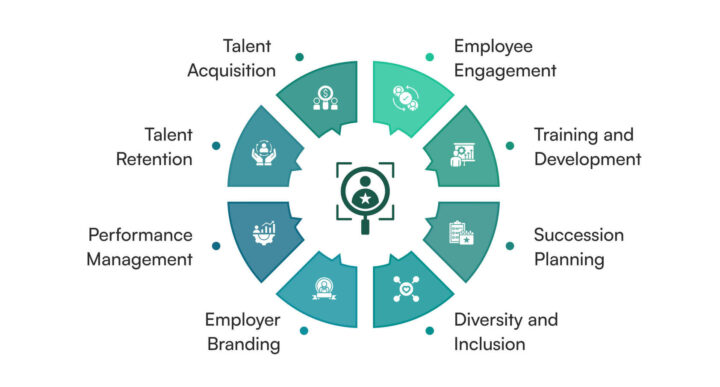For organizations operating globally, international talent management presents unique challenges and opportunities. Addressing these considerations is crucial for effective global talent strategies.
What is Talent Management?
Talent management is a comprehensive, strategic approach to optimizing human capital within an organization. It encompasses a range of interconnected processes aimed at attracting, identifying, developing, engaging, retaining, and deploying individuals who are crucial to an organization’s success. This approach extends beyond traditional human resource management by focusing on leveraging human potential to meet business objectives and drive organizational growth.
At its core, talent management involves workforce planning, where current and future talent needs are analyzed based on business strategy. It includes talent acquisition, which focuses on sourcing, recruiting, and hiring individuals with the skills and potential to significantly contribute to the organization.

Benefits of Talent Management
Implementing a comprehensive talent management strategy offers a wide array of advantages for organizations across various industries and sizes. These benefits extend beyond the human resources department, impacting overall business performance, employee satisfaction, and long-term organizational success. Understanding these benefits is crucial for business leaders to recognize the value of investing in robust talent management practices:
- Improved business performance. By ensuring that skilled employees are in key positions, talent management directly contributes to enhanced organizational productivity and efficiency.
- Increased employee engagement. When employees see opportunities for growth and development, they become more engaged, leading to higher job satisfaction and commitment to the organization.
- Better talent retention. Effective talent management practices reduce turnover by providing clear career paths and development opportunities, saving significant recruitment and training costs.
- Enhanced ability to attract top talent. A strong talent management reputation makes an organization more attractive to high-caliber candidates, improving the quality of new hires.
- Increased agility and adaptability. Well-managed talent enables organizations to respond more quickly to market changes and new opportunities.
- Better alignment of employee goals with business objectives. Talent management ensures that individual performance goals are directly linked to overall organizational strategies.
- Enhanced employer brand. Organizations known for effective talent management tend to have stronger employer brands, making it easier to attract and retain top talent.
- Increased innovation. By nurturing and developing employee skills, talent management fosters a culture of innovation and continuous improvement.
- Cost savings. While implementing talent management strategies requires investment, the long-term benefits in reduced turnover, increased productivity, and improved performance often result in significant cost savings.
- Competitive advantage. Organizations with effective talent management are better positioned to outperform competitors by leveraging their human capital more effectively.
The multifaceted benefits of talent management underscore its importance as a critical business strategy rather than just an HR function.
Submit a request and we will develop a customized solution
Stages of Implementation of the Talent Management System
Implementing talent management solutions requires a structured approach to ensure successful adoption and integration within the organization.
Implementation steps:
- Needs assessment. Conduct a thorough analysis of current talent management processes and identify areas for improvement.
- Solution selection. Evaluate and select appropriate talent management services or software that align with organizational needs and goals.
- Customization. Tailor the chosen solutions to fit the specific requirements of the organization, including integration with existing systems.
- Pilot testing. Implement the solutions on a small scale to identify and address any issues before full-scale rollout.
- Training and communication. Provide comprehensive training to all users and communicate the benefits and expectations of the new system.
- Full implementation. Roll out the talent management solutions across the organization, ensuring proper support and guidance.
- Monitoring and optimization. Continuously monitor the performance of the implemented solutions and make necessary adjustments for optimal results.
Successful implementation of talent management solutions requires careful planning, stakeholder buy-in, and ongoing support to ensure maximum benefit for the organization.
Measuring Talent Management Success
Measuring the success of talent management initiatives is crucial for demonstrating value and identifying areas for improvement.
Key metrics:
- Employee retention rate. Measure the percentage of employees who remain with the company over a specific period.
- Time-to-fill. Track the average time taken to fill open positions within the organization.
- Quality of hire. Assess the performance and cultural fit of new hires over their first year of employment.
- Employee engagement scores. Conduct regular surveys to measure employee satisfaction and engagement levels.
- Internal promotion rate. Monitor the percentage of leadership positions filled by internal candidates.
- Training effectiveness. Evaluate the impact of learning and development programs on employee performance.
- Talent pipeline strength. Assess the readiness of identified successors for key positions within the organization.
Regular measurement and analysis of these metrics provide valuable insights into the effectiveness of talent management strategies and guide future improvements.
Our talent management system with AI has increased employee retention by 12% – a clear indicator that our approach is working. Management can now find the perfect solution for their employees, ensuring both satisfaction and productivity.

Talent Management Model
A talent management model provides a structured framework for organizations to effectively manage their human capital throughout the employee lifecycle. This model serves as a roadmap for designing and implementing comprehensive talent strategies that align with business objectives.
The talent management model encompasses several key components, each playing a crucial role in the overall strategy. Talent acquisition forms the foundation, focusing on attracting and hiring top talent through employer branding, recruitment marketing, and selection processes. Once hired, the onboarding and integration process ensures new employees are effectively assimilated into the organization, accelerating their time-to-productivity and enhancing engagement from the start.
By adopting a comprehensive talent management model, organizations can create a systematic approach to attracting, developing, and retaining top talent, ultimately driving business performance and competitive advantage in today’s dynamic business environment.
Top Talent Management Strategies in 2024
Talent management strategies in 2024 address global workforce changes and evolving business needs. Organizations implement agile, technology-driven, and employee-focused approaches to manage talent effectively.
- Remote and hybrid work models. Companies optimize virtual onboarding and maintain culture in distributed work environments. Advanced collaboration tools and virtual team-building activities support these efforts.
- AI and machine learning. AI-powered tools streamline recruitment, predict turnover, and personalize learning recommendations. Predictive analytics inform workforce planning and succession management decisions.
- Diversity, Equity, and Inclusion (DEI). Organizations use AI to reduce hiring bias, implement diverse leadership programs, and conduct regular compensation audits for pay equity.
- Skills-based talent management. Focus shifts from role-based to skills-based management. Continuous learning and reskilling programs address rapidly evolving technology and business needs.
- Employee wellbeing. Holistic wellness programs address physical, mental, and financial health. Flexible work arrangements, mental health resources, and financial planning assistance are standard offerings.
- Personalized employee experience. Employee feedback platforms and AI-driven insights tailor development opportunities, recognition programs, and career paths to individual preferences.
- Gig economy integration. Organizations adopt flexible talent models, integrating freelancers and contract workers into the workforce. Strategies to manage and engage this flexible talent pool are developed.
- Sustainability and corporate social responsibility. Talent strategies align with environmental and social goals to attract and retain socially conscious employees, particularly younger generations.
Successful talent management strategies in 2024 are adaptable, technologically integrated, and focused on holistic employee development. Organizations that implement these practices effectively gain a competitive advantage in the global marketplace.
Conclusion
As businesses continue to evolve in an increasingly global and digital environment, talent management will play an even more critical role in organizational success.
Organizations that prioritize and invest in effective talent management strategies will be better positioned to attract, develop, and retain the high-quality talent necessary for long-term success in a competitive business landscape. By leveraging talent management solutions, embracing technology, and adapting to changing workforce dynamics, businesses can create a strong foundation for sustained growth and innovation.




